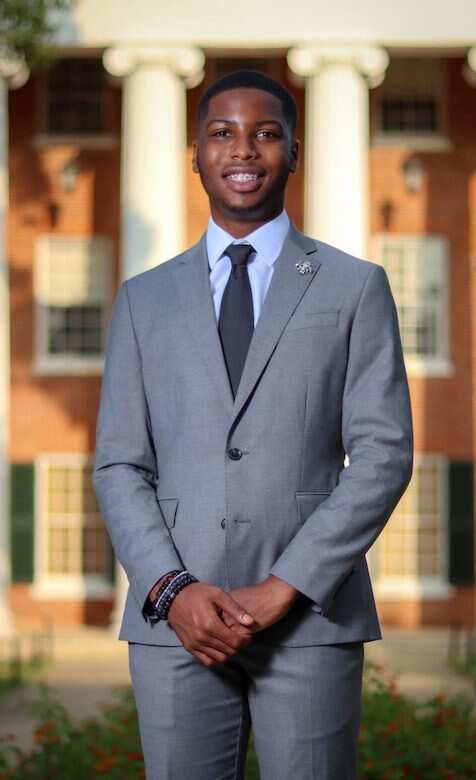Jonathan Dabel, Je’Von D. Franklin to work with initiative aimed at solving education challenges

Jonathan Dabel
Two University of Mississippi students have been chosen to participate in an inaugural national network program designed to use technology to innovate teaching and learning with the goal of improving outcomes for Black, Latino and indigenous students, poverty-affected students and first-generation students across the nation.
Jonathan Dabel, of Diamondhead, and Je’Von D. Franklin, of Brooksville, are among 16 undergraduate students selected nationwide to receive Every Learner Everywhere Network Fellowships. The program is a six-month, project-based fellowship that enables students selected to work on an interest- and skill-aligned project while developing meaningful professional relationships with a variety of 12 network partners.
The project areas include education technologies, curriculum and course design strategies and teaching practices, among other concentrations.
Dabel and Franklin each will receive a $3,000 stipend for the program, which began Feb 15 and runs through July 15.
“It is a great honor to have these UM students accepted in this inaugural program,” said Patricia O’Sullivan, program manager of externally funded academic innovation projects. “We are really proud to have Je’von and Jonathan representing the University of Mississippi.”
A freshman economics and mathematics major, Dabel is collaborating with the National Center for Research in Advanced Information and Digital Technologies, also known as Digital Promise. Equity in higher education is an issue he plans to continue to research in the future.
“The sole reason why I am majoring in economics is that I believe inequity and how well a student does in school have a strong relationship to their parents’ economic status, the neighborhood they live in and how well funded their school is,” said Dabel, who was born in Massachusetts but raised in Haiti.
“Digital Promise is focused on mostly how we can use technology to make higher education an equitable place for all. Most of the time, we read surveys, analyze data and, most importantly, we provide innovative ideas.”
Dabel said that by the end of the program, he hopes to better understand what conducting research on economic inequality and what working in a professional setting feels like.
“All inequity issues, especially among African American students, are related to their parent’s economic status and the environment they are growing up in,” he said. “It’s a cycle that repeats itself and a crisis that not many people seem to care about.”

Je’Von Franklin
Franklin, a senior African American Studies major, said being a fellow with the ELE network gives him an opportunity to work with Achieving the Dream.
“I will have the opportunity to provide student-centered input in the course design, how to facilitate professional group discussions, and learn foundational course design skill,” he said. “I will be learning and benefiting from studying theories and best practices alongside the Achieving the Dream team, who are some of the best in the field at applying equity-minded learning theories in higher education.”
Franklin said he wants to learn how to design student-centered courses.
“Online instruction is not engaging for all students,” he said. “Hopefully by the end of this fellowship, I will have experience in designing courses and will be able to assist professors worldwide with designing student-centered courses.”
Dabel and Franklin will serve as project managers or provide project support on one project during their time in the program.
Fellows work on projects with one of four ELE partner organizations: Achieving the Dream, Digital Promise, SXSU EDU or Intentional Futures. They also meet additional network members through informational interviews and student-led panels.
Each of the partner organizations have an expertise in evaluating, implementing, scaling and measuring the efficacy of education technologies, course design strategies, teaching practices and support services that personalize instruction for students in blended and online learning environments.
All 16 fellows will be in cohort groups of four to five and work directly with one of the network partners on a project that aligns to the fellow’s major or professional interest. Fellows will also serve as co-designers of the program to shape their experience and the experience for future fellows.
At the end of the program, the students will have an opportunity to present their learnings in a formal presentation to the network.
For more information about the Every Learner Everywhere Network, visit here.